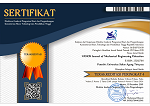Implementation of Android Application-Based Learning Media on Motorcycle Electrical Maintenance Materials in Vocational High Schools
Abstract
Purpose of this study was to produce learning media and test the feasibility of learning media based on android applications at Vocational High Schools. The type of research used in this research is implementation research. The subjects in the study were 31 students of class XI TBSM Vocational High Schools. The data collection instrument used quantitative descriptive analysis to determine the feasibility of learning media. The results of this study indicate: (1) Development research produces learning media for motorcycle electrical maintenance materials for students of class XI TBSM with the development process through the following stages: (2) Android-based learning media is categorized as feasible to use in learning to get validation results from Experimental class of 87.5%, Control class 78.5%, So it can be concluded that learning with Android is more effective for students.
Keywords
Full Text:
PDFReferences
L. Unwin, Vocational Training, vol. 2. Elsevier Inc., 2011. doi: 10.1016/B978-0-12-373951-3.00095-8.
S. Boss and J. Krauss, Reinventing project-based learning: Your field guide to real-world projects in the digital age. books.google.com, 2022. [Online]. Available: https://books.google.com/books?hl=en&lr=&id=ZK-FEAAAQBAJ&oi=fnd&pg=PA1&dq=vocational+education+outcome+based+learning+learning+model+curriculum&ots=Yovkx6hKzP&sig=pV_b-XhTj09bbPcGMAbe7JihduE
A. B. Johan, S. PH, and Widodo, “Evaluation of education implementation of link and match systems of the industrial and vocational school in Yogyakarta province,” J. Taman Vokasi, vol. 7, no. 2, pp. 216–222, 2019.
S. D. S. Sigit Purnomo, Slamet Priyanto, Eko Adi, “Development of Learning Media Using the Sparkol Videoscribe Application on Measuring Tools at Vocational High School,” J. Mech. Eng. Educ., vol. 7, no. 1, pp. 11–18, 2022.
S. Purnomo and M. B. Triyono, “Efektifitas Technopreneurship Dengan Model Pembelajaran Cooperative Learning By Technopreneur For SMK Untuk Siswa Di SMK,” TAMAN VOKASI, 2018, doi: 10.30738/jtvok.v6i1.2972.
I. Calero López and B. Rodríguez-López, “The relevance of transversal competences in vocational education and training: a bibliometric analysis,” Empir. Res. Vocat. Educ. Train., 2020, doi: 10.1186/s40461-020-00100-0.
T. Toda, M. Sakai, M. Hakariya, and T. Kato, “The New Inline 4 Cylinder 2.5L Gasoline Engine with Toyota New Global Architecture Concept,” Int. Wiener Mot., 2017.
M. Nurtanto et al., “Information media literacy to improve working concept comprehension of ignition system with contact breaker and problem-based learning,” 2019. doi: 10.4108/eai.21-9-2018.2281183.
R. Rabiman, M. Nurtanto, and N. Kholifah, “Design and development E-learning system by learning management system (Lms) in vocational education,” Int. J. Sci. Technol. Res., 2020.
A. Rubianto, “Pengembangan Modul Berbasis Aplikasi Android untuk Mata Kuliah Ilmu Bahan Teknik pada Prodi D3 Teknik Mesin Universitas Negeri Malang,” J. Tek. Mesin dan Pembelajaran, vol. 2, no. 2, p. 124, 2020, doi: 10.17977/um054v2i2p124-133.
A. K. Sigit Purnomo, Elyas Djufri, “Pendidikan jarak jauh (PJJ) berbasis e-learning edmodo mahasiswa pendidikan vokasional teknik mesin,” J. Taman Vokasi, vol. 8 (2), p. 74, 2020.
D. Ratnawati, W. Mustafa Kusuma, S. Setuju, M. Nurtanto, and W. Widodo, “Development of Job Sheet Lathe Machining Practice Based on Animation Video as Interactive Learning Media,” 2020. doi: 10.1088/1742-6596/1573/1/012005.
A. A. Anggraeni and R. A. Surya, “Developing a Demonstration Video on Making Dry Banana Preferred by Generation Z,” Journal of Physics: Conference Series, vol. 1737, no. 1. 2021. doi: 10.1088/1742-6596/1737/1/012037.
N. A. Handoyono, R. Rabiman, P. Pribadi, and S. Purnomo, “Improvement of Learning Motivation and Learning Outcomes by Applying The Problem Based-Learning Method,” TAMAN VOKASI, 2019, doi: 10.30738/jtv.v7i2.6318.
P. Partono, H. N. Wardhani, N. I. Setyowati, A. Tsalitsa, and S. N. Putri, “Strategi Meningkatkan Kompetensi 4C (Critical Thinking, Creativity, Communication, & Collaborative),” J. Penelit. Ilmu Pendidik., 2021, doi: 10.21831/jpipfip.v14i1.35810.
M. Azhar, S. Mustapa, M. Ibrahim, and A. Yusoff, “Engaging Vocational College Students through Blended Learning : Improving Class Attendance and Participation,” Procedia - Soc. Behav. Sci., vol. 204, no. November 2014, pp. 127–135, 2015, doi: 10.1016/j.sbspro.2015.08.125.
N. A. Handoyono and R. Rabiman, “Development of android-based learning application in EFI materials for vocational schools,” in Journal of Physics: Conference Series, 2020, pp. 1–8. doi: 10.1088/1742-6596/1456/1/012050.
M. B. Zaman and M. Taufiqurrohman, “Rancang Bangun Sistem Kontrol Dan Pemantau ROV (Remotely Operated Vehicles) Berbasis Android,” J. Tek. Elektro dan Komput. TRIAC, 2018, doi: 10.21107/triac.v5i1.3833.
A. Khaharsyah, “Pengembangan Media Pembelajaran Berbasis Android untuk Siswa Teknik Ketrampilan Kendaraan Ringan SMK,” SOSIOHUMANIORA J. Ilm. Ilmu Sos. Dan Hum., 2020, doi: 10.30738/sosio.v6i2.8263.
R. V. B. Tutu, W. A. Areros, and J. J. Rogahang, “Pengaruh Budaya Organisasi dan Lingkungan Kerja Terhadap Kinerja Karyawan PT. Astra International Daihatsu Tbk Cabang Manado,” J. Product. e-ISSN. 2723-0112, 2022.
Sugiyono, Metode Penelitian Pendidikan (Pendekatan Kuantitatif, Kualitatif, dan R&D). Bandung: Alfabeta., 2010.
P. D. Sugiyono, Statistika untuk Penelitian. Bandung: Alfabeta., 2015.
Sugiyono, Statistika untuk Penelitian. Bandung: ALFABETA, 2007.
S. Thiagarajan, D. S. Semmel, and M. I. Semmel, Instructional development for training teachers of exceptional children: A sourcebook. Twin Cities: Leadership Training Institute/Spesial Education, University of Minnesota, 2016. doi: 10.1016/0022-4405(76)90066-2.
G. Falloon, “From digital literacy to digital competence: the teacher digital competency (TDC) framework,” Educ. Technol. Res. Dev., vol. 68, no. 5, pp. 2449–2472, 2020, doi: 10.1007/s11423-020-09767-4.
D. Ratnawati, S. Hadi, S. Setuju, B. Rahmat Setiyadi, S. Purnomo, and N. Arifin Handoyono, “Retooling practice learning model based on project based learning integrated to Tamansiswa studies at university,” Int. J. Recent Technol. Eng., 2019.
Suyitno, A. Primartadi, D. Jatmoko, M. Nurtanto, and D. Ratnawati, “The influence of audio visual media on student interest: Automotive clutch power train system,” J. Phys. Conf. Ser., vol. 1700, no. 1, pp. 0–8, 2020, doi: 10.1088/1742-6596/1700/1/012049.
Q. Huifang and J. Hao, “The Status Quo and Thinking of Classical Music Education and Learning in Higher Vocational Colleges in China,” ACM International Conference Proceeding Series. pp. 90–95, 2021. doi: 10.1145/3463531.3463545.
Bambang Sudarsono, B. Santosa, and H. Sofyan, “Improving The Competency of Automotive Vocational Teachers with Partnership-Based Training Model (PBK),” JTP - J. Teknol. Pendidik., 2021, doi: 10.21009/jtp.v22i3.18690.
K. Azizah, Murniati AR., “Strategi Kerjasama Sekolah Dengan Dunia Usaha Dan Dunia Industri (Du/Di) Dalam Meningkatkan Kompetensi Lulusan Pada Smk Negeri 3 Banda Aceh,” Pascasarj. Univ. Syiah Kuala, vol. 11, no. 2, p. 148, 2015.
DOI: http://dx.doi.org/10.30870/vanos.v8i2.22454
Refbacks
- There are currently no refbacks.

This work is licensed under a Creative Commons Attribution 4.0 International License.


.png)
.png)
